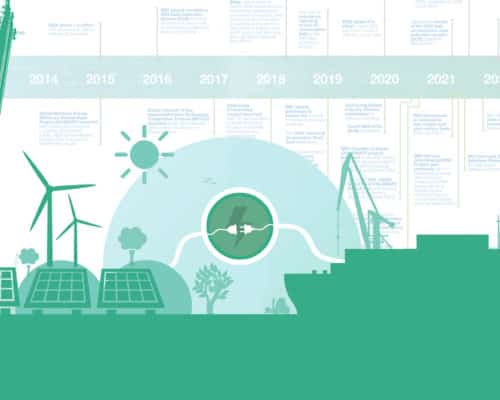Region
South Korea’s LNG Reliance
South Korea is deeply involved in the development of LNG import and gas-to-power infrastructure across the Asia. It must divert its resources to renewables.
High Energy Prices Wreak Havoc on Sri Lankan, Bangladeshi and Pakistani Economies
Before Russia’s invasion of neighbouring Ukraine, Sri Lanka, Bangladesh and Pakistan had set their hopes on LNG to diversify their respective power generation mixes away from an overreliance on coal. However, record high LNG prices in the Asia-Pacific region, for both spot procurement and LNG indexed to crude oil, have wreaked havoc on these countries.
Electricity Price Hikes in the Philippines
The filed petition for a temporary adjustment to the 2019 power supply agreements by SMC and Meralco and its rejection by the regulator are yet more indications of the importance of proper risk management and the drawbacks of relying on fossil fuels in a net-zero-chasing world.
Using Transition Bonds For Ammonia and Blue Hydrogen Projects: The Risks For Investors and the Issuing Companies
Using transition bonds to fund blue hydrogen and ammonia projects risks extending the climate crisis. But, more importantly, it tarnishes the idea of climate financing at a time when it is needed the most.
Climate Change in Japan: The Role of Japanese Companies
Japanese companies can be a real driving force in the country’s decarbonisation journey. The government, on the other hand, has to set more ambitious targets. Only by working together can the state and the private sector accelerate Japan's net-zero transition.
UN General Assembly 77 (UNGA 2022) Convenes After Pakistan Flooding
The UN General Assembly 77 comes at a time when climate impacts are at the forefront of the global agenda. From the climate-related disasters in Pakistan to soaring fossil fuel costs, the stage is set for countries to discuss some of the major climate issues that remain unresolved after COP26. This includes the lack of climate funding for developing countries and the growing economic cost of inaction.
San Miguel Corporation’s LNG Projects and their Implications for the Company and the Philippines
Natural gas has successively been shown to oppose the goals of solving the energy crisis. It causes environmental issues and won't help the Philippines decarbonise. Gas is now an impractical choice for the San Miguel Corporation, the regions biggest LNG developer.
Is Carbon Capture Viable? New IEEFA Report Says No
Carbon capture is one of the most controversial low-carbon technologies discussed today. Proponents see it as a way of reducing emissions from fossil fuel heavy industries, yet opponents view it as a way of avoiding the adoption of renewables.
Samsung Joins RE100: The Effect on South Korea’s Clean Energy Progress
Korean RE100 members have to take leadership by pushing policy-makers to expand renewable energy supply and lower prices. Samsung's involvement can be the decisive factor that urges the Korean leadership to make a change.
Rent-to-own Solar Panels for Home in Singapore
Singapore has lofty renewable energy and solar capacity targets. However, the country has limited available land and will need to harness residential structures to meet its goals.
MHI First Transition Bond Program – All You Need to Know
Instead of the innovative green financing mechanism they were supposed to be, transition bonds have become the perfect tool for greenwashing. MHI's first transition bonds program can either accelerate the company's net-zero efforts or further distance it from carbon neutrality. The key is in MHI's hands.
The Outlook for Electric Cooking in Asia
Many low-income households in developing Asia continue to use wood as the primary fuel for cooking. Despite the sufficient amount of electricity access, for most middle and high-income households across developed and developing Asian countries, gas and LPG remain the preferred choice. Governments have to stimulate the transition to electric cooking to help households ensure more affordable and cleaner cooking.

Is There a Future For Wind Turbines in Singapore?
Singapore has many road blocks in adopting low carbon energy, one of which is the lack of viability for wind turbines. The country's most efficient renewable energy option is solar energy. However, even solar faces its own challenges – mainly limited land. As an alternative, Singapore is looking toward its neighbouring nations to import low-carbon energy in pursuit of its net-zero goals.
Vietnam’s National Climate Change Strategy to 2050 and the Plan for Meeting Its COP26 Commitments
Vietnam's latest move is proving that despite the growing needs of its energy-hungry economy, it will actively pursue its net-zero commitment and prioritise climate change mitigation and adaptation efforts – a move that other Asian countries should take note of.
Most Popular
Categories
-
10
-
35
-
126
-
4
-
17
-
46
-
52
-
11
-
10
-
15
-
24
-
6
-
1
-
5
-
6
-
284
-
200
-
17
-
24
-
1
-
1
-
23
-
41
-
44
-
88
-
18
-
86
-
41
-
17
-
11
-
43
-
54
-
86
-
299
-
22
-
44
-
36
-
11
-
42
-
36

